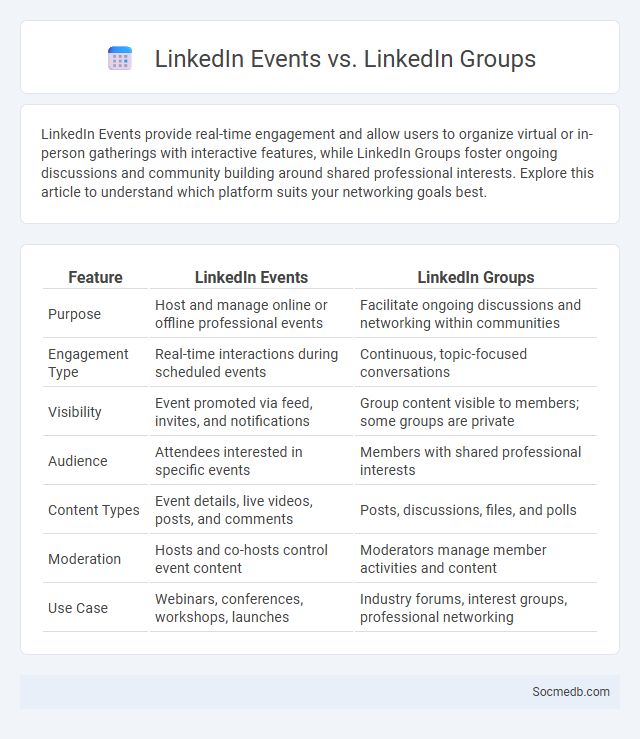
Photo illustration: LinkedIn Events vs LinkedIn Groups
LinkedIn Events provide real-time engagement and allow users to organize virtual or in-person gatherings with interactive features, while LinkedIn Groups foster ongoing discussions and community building around shared professional interests. Explore this article to understand which platform suits your networking goals best.
Table of Comparison
| Feature | LinkedIn Events | LinkedIn Groups |
|---|---|---|
| Purpose | Host and manage online or offline professional events | Facilitate ongoing discussions and networking within communities |
| Engagement Type | Real-time interactions during scheduled events | Continuous, topic-focused conversations |
| Visibility | Event promoted via feed, invites, and notifications | Group content visible to members; some groups are private |
| Audience | Attendees interested in specific events | Members with shared professional interests |
| Content Types | Event details, live videos, posts, and comments | Posts, discussions, files, and polls |
| Moderation | Hosts and co-hosts control event content | Moderators manage member activities and content |
| Use Case | Webinars, conferences, workshops, launches | Industry forums, interest groups, professional networking |
Overview: LinkedIn Events, LinkedIn Groups, and Niche Communities
LinkedIn Events enables professionals to host virtual gatherings, fostering industry networking and learning opportunities within a focused environment. LinkedIn Groups provide a platform for members to engage in topic-specific discussions, share insights, and build relationships among peers with similar professional interests. Niche communities on LinkedIn serve targeted audiences, enhancing collaboration and knowledge exchange through specialized content and expert interactions.
Purpose and Use Cases: Events vs Groups vs Niche Communities
Social media platforms serve distinct purposes based on their structure and user engagement models, with events facilitating real-time interaction and promotion, groups offering ongoing discussions among members with shared interests, and niche communities catering to specialized topics or professional fields. Your choice among these depends on whether you aim to generate event attendance, foster continuous dialogue, or connect deeply within a specific domain. Optimizing your social media strategy by leveraging event pages drives immediate action, groups build loyal community engagement, and niche communities enhance targeted networking and expertise sharing.
Audience Targeting: Reach and Engagement Potential
Precise audience targeting on social media platforms significantly increases your reach and engagement potential by delivering content tailored to specific demographics, interests, and behaviors. Utilizing advanced analytics and AI-driven tools allows you to identify and connect with high-value users most likely to interact with your brand. Optimizing campaigns based on data insights ensures maximum visibility and higher conversion rates within your preferred audience segments.
Content Sharing and Communication Features
Social media platforms enable seamless content sharing through features like photo and video uploads, live streaming, and story updates, allowing users to distribute multimedia with ease. Communication is enhanced by real-time messaging, group chats, and comment sections that foster interaction and engagement among communities. Your ability to connect and share diverse content on these networks amplifies visibility and strengthens online relationships.
Networking Opportunities: Connections and Relationship Building
Social media platforms offer vast networking opportunities by connecting you with professionals, industry experts, and like-minded individuals worldwide. These connections facilitate relationship building through direct messaging, group interactions, and collaborative content sharing. Leveraging social media effectively enhances your professional network and opens doors to career growth and business partnerships.
Event Management vs Ongoing Community Interaction
Effective event management on social media requires targeted campaigns that generate buzz and drive attendance within a specific timeframe. In contrast, ongoing community interaction emphasizes continuous engagement through regular content updates, conversations, and support to foster long-term loyalty. Brands balancing both strategies maximize reach by combining event-driven excitement with sustained relationship-building.
Moderation and Privacy Controls
Effective social media moderation ensures that harmful content is filtered out, creating a safer and more positive online environment. Robust privacy controls empower you to manage who can see your posts and personal information, enhancing your digital security. Platforms continuously update these features to address evolving threats and maintain user trust.
Brand Building and Lead Generation Differences
Brand building on social media centers on creating a strong, recognizable identity through consistent messaging, visual elements, and engaging content that fosters trust and loyalty. Lead generation focuses on capturing user interest via targeted ads, call-to-action buttons, and optimized landing pages designed to convert social media traffic into qualified sales prospects. While brand building enhances long-term reputation and customer relationships, lead generation drives immediate sales opportunities through measurable campaigns.
Analytics and Performance Tracking
Social media analytics tools provide valuable insights into user engagement, content reach, and audience demographics, enabling data-driven decision making. Performance tracking metrics such as click-through rates, conversion rates, and sentiment analysis help optimize campaigns for higher ROI. Real-time dashboards and automated reports facilitate continuous monitoring and strategic adjustments to enhance brand visibility and customer interaction.
Choosing the Best Platform for Your Community Goals
Selecting the best social media platform for your community goals depends on understanding the target audience demographics and engagement patterns unique to each network. For instance, Instagram and TikTok excel in visual content and younger audiences, while Facebook offers robust group features ideal for fostering large, interactive communities. Leveraging analytics tools to monitor platform-specific user behavior can optimize content strategy and enhance community growth and interaction.
 socmedb.com
socmedb.com